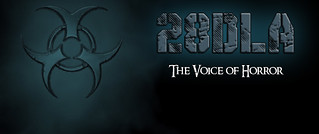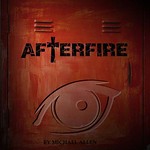*full disclosure: an online screener of this film was provided by producer and actor Jon Kondelik. Kondelik and this critic have worked together, in the past.
Director/writer: Jose Prendes.
Cast: Graham Denman, Hannah Levien, Barbara Crampton, Sean Whalen, Ken Foree and Lynn Lowry.
The Divine Tragedies is an unreleased film from production house Dual Visions. Developed by Jose Prendes (The Haunting of Whaley House), The Divine Tragedies is a tale of two murderous brothers. On separate paths, the two brothers come to blows, on their murderous tactics and ideologies. The film also introduces a host of horror stars, but most are underused. Instead, this indie feature focuses on one brother's destruction and descent into madness. Meanwhile, the green and red lighting added in a nightmarish quality, while the story developed in a dream-like fashion, overall. The Divine Tragedies offers a compelling story and indie film fans will enjoy the film's central conflict.
Charles (Graham Denman) and Thomas (Jon Kondelik) are half-brothers. Spawned from a villainous and perpetually drunk mother, the two brothers hope to pull off the perfect murder. They stalk prostitutes and charm waitresses. But, their final goal is to kill their poison-filled mother, through a proxy. They choose another mother to kill, Genevieve (Hannah Levien). Though, their murder hardly goes to plan and soon, a psychic detective is hot on their trail. One brother is guilt stricken, while the other is enamoured by murder. Eventually, the two brothers must face each other as their differing values compete for screen time.
The lighting in the film is very strange. The effects team have a love of the colours green and red. But, the film is not set during Christmas time and there are no traffic lights, nearby. Instead of amplifying the tension on screen, the lighting adds in a dream-like quality. Red will flash on the right of the screen, while green flashes on the left. One scene, involving Charles, looks both hellish and earthy, at the same time. The colouring may highlight Charles' descent into delusion. But, the film's reality is definitely broken up slightly as the lighting offers an off-and-on dream-like quality.
The Divine Tragedies is also indie in quality. A small film, the production relies on a number of interior shots. A few settings, including: a theatre, a home and a coffee shop, are used extensively. But, there is little to no action occurring outside. Only a couple of scenes take place in exterior settings. Even driving sequences are shot inside and a screen is used to show other cars, in the background. This shooting style and lack of exterior shooting can create a claustrophobic feeling, with this viewer hoping for more complex and brighter shots. Though, Prendes does utilize a couple of mirrors to show off-screen characters. These scenes also show dimension and space, better than most films. As well, this is not an effects laden feature. Instead, the filmmakers focus on the characters and the story. This focus on story and characters create believable dialogue and action. And, in film, story and characters are what truly matters.
The conflict between Charles and Thomas fuels the film. They begin their murder spree together. But, Thomas quickly jumps off the murder train. Both brothers begin as villains. However, Thomas emerges as the protagonist as he forgoes his desire to kill. Charles' villainous nature only grows over time. He becomes more dominant and more murderous. Charles also descends into delusion, seeing himself as a killing god. One brother turns to vice, while the other turns to virtue. This split in the narrative creates for some of the film's best conflict. The competition between brothers is as old as recorded time. And, this Cain and Abel storyline is developed with believability and it also energizes the final climax.
The Divine Tragedies has completed production and this critic believes that it will be released shortly. And, indie film fans will find an intriguing storyline here, one which is based on historical fact. This viewer enjoyed the dialogue between brothers and the other characters. The interactions are well crafted, while production elements are mostly of high quality. Some of the settings are repeated too often. But, all of the familial conflicts help heighten the tension in the film. The final denouement still offers questions. And, this viewer wanted to see more from the creators of this film, with the film ending quickly and bloodily.
Overall: 7 out of 10 (a good story and well developed, surreal lighting and sequences, not everything is explained).
The most recent trailer for the film is hosted here:
A Divine Tragedies Trailer on 28DLA
Subscribe to 28 Days Later: An Analysis Email Subscription
Director/writer: Jose Prendes.
Cast: Graham Denman, Hannah Levien, Barbara Crampton, Sean Whalen, Ken Foree and Lynn Lowry.
The Divine Tragedies is an unreleased film from production house Dual Visions. Developed by Jose Prendes (The Haunting of Whaley House), The Divine Tragedies is a tale of two murderous brothers. On separate paths, the two brothers come to blows, on their murderous tactics and ideologies. The film also introduces a host of horror stars, but most are underused. Instead, this indie feature focuses on one brother's destruction and descent into madness. Meanwhile, the green and red lighting added in a nightmarish quality, while the story developed in a dream-like fashion, overall. The Divine Tragedies offers a compelling story and indie film fans will enjoy the film's central conflict.
Charles (Graham Denman) and Thomas (Jon Kondelik) are half-brothers. Spawned from a villainous and perpetually drunk mother, the two brothers hope to pull off the perfect murder. They stalk prostitutes and charm waitresses. But, their final goal is to kill their poison-filled mother, through a proxy. They choose another mother to kill, Genevieve (Hannah Levien). Though, their murder hardly goes to plan and soon, a psychic detective is hot on their trail. One brother is guilt stricken, while the other is enamoured by murder. Eventually, the two brothers must face each other as their differing values compete for screen time.
The lighting in the film is very strange. The effects team have a love of the colours green and red. But, the film is not set during Christmas time and there are no traffic lights, nearby. Instead of amplifying the tension on screen, the lighting adds in a dream-like quality. Red will flash on the right of the screen, while green flashes on the left. One scene, involving Charles, looks both hellish and earthy, at the same time. The colouring may highlight Charles' descent into delusion. But, the film's reality is definitely broken up slightly as the lighting offers an off-and-on dream-like quality.
The Divine Tragedies is also indie in quality. A small film, the production relies on a number of interior shots. A few settings, including: a theatre, a home and a coffee shop, are used extensively. But, there is little to no action occurring outside. Only a couple of scenes take place in exterior settings. Even driving sequences are shot inside and a screen is used to show other cars, in the background. This shooting style and lack of exterior shooting can create a claustrophobic feeling, with this viewer hoping for more complex and brighter shots. Though, Prendes does utilize a couple of mirrors to show off-screen characters. These scenes also show dimension and space, better than most films. As well, this is not an effects laden feature. Instead, the filmmakers focus on the characters and the story. This focus on story and characters create believable dialogue and action. And, in film, story and characters are what truly matters.
The conflict between Charles and Thomas fuels the film. They begin their murder spree together. But, Thomas quickly jumps off the murder train. Both brothers begin as villains. However, Thomas emerges as the protagonist as he forgoes his desire to kill. Charles' villainous nature only grows over time. He becomes more dominant and more murderous. Charles also descends into delusion, seeing himself as a killing god. One brother turns to vice, while the other turns to virtue. This split in the narrative creates for some of the film's best conflict. The competition between brothers is as old as recorded time. And, this Cain and Abel storyline is developed with believability and it also energizes the final climax.
The Divine Tragedies has completed production and this critic believes that it will be released shortly. And, indie film fans will find an intriguing storyline here, one which is based on historical fact. This viewer enjoyed the dialogue between brothers and the other characters. The interactions are well crafted, while production elements are mostly of high quality. Some of the settings are repeated too often. But, all of the familial conflicts help heighten the tension in the film. The final denouement still offers questions. And, this viewer wanted to see more from the creators of this film, with the film ending quickly and bloodily.
Overall: 7 out of 10 (a good story and well developed, surreal lighting and sequences, not everything is explained).
The most recent trailer for the film is hosted here:
A Divine Tragedies Trailer on 28DLA
Subscribe to 28 Days Later: An Analysis Email Subscription


 Thursday, April 02, 2015
Thursday, April 02, 2015
 Michael Allen
Michael Allen




 Posted in:
Posted in: 


0 comments:
Post a Comment